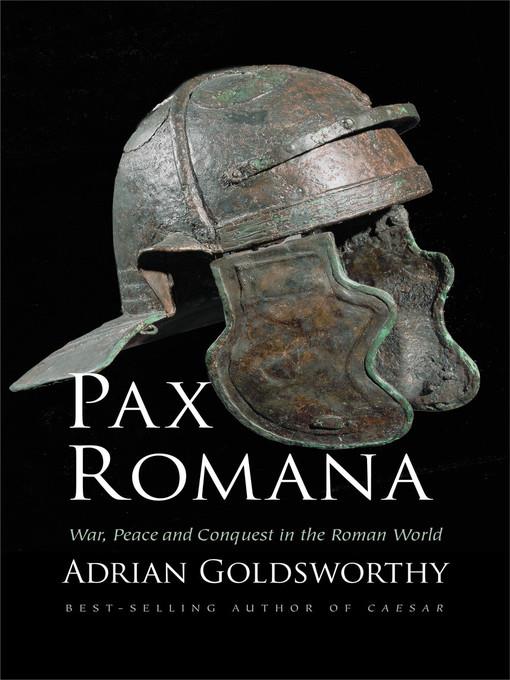
Pax Romana
War, Peace and Conquest in the Roman World
کتاب های مرتبط
- اطلاعات
- نقد و بررسی
- دیدگاه کاربران
نقد و بررسی

An exploration of the "Roman Peace," which held "sway over much of Western Europe, the Middle East, and North Africa for centuries."The world has entered what some call the Pax Americana. Everyone knows that this phrase refers to ancient Rome, but it's meant ironically because empires are now assumed to be despotic. Before World War II, empires enjoyed good press, and ancient Romans shared many Americans' conviction that anyone with good sense wanted to be like them. In this thick but entirely compelling account, acclaimed British historian Goldsworthy (Augustus: First Emperor of Rome, 2014, etc.), who has written extensively about the Roman Empire, explains how it enforced genuine and long-lasting, if not idyllic, peace. From its founding in the eighth century B.C.E., the Italian town expanded by beating up on its neighbors, but Rome was unusual not because of its pugnacity but because of its success. Unwarlike societies in Iron Age Europe quickly vanished. "The Roman Republic celebrated military achievement as the greatest service of the state," writes the author, "and mobilized extremely large resources...to wage war virtually every year." After 150 B.C.E., having crushed Carthage and Macedonia, it ruled the western Mediterranean and began moving east. Expansion continued despite brutal civil wars that ended when Augustus became emperor in 27 B.C.E., the traditional beginning of Pax Romana, which lasted more than two centuries. The empire continued to expand, but wars tended to be at the frontier. As long as taxes arrived, provincial elites were allowed to govern according to local customs, and most of the empire was peaceful most of the time. Goldsworthy rightly reminds readers that external forces destroyed Rome. Unlike recent empires (British, French, Soviet), its colonies never rose up to demand freedom. They wanted to remain Roman. An engrossing account of how the Roman Empire grew and operated. COPYRIGHT(1) Kirkus Reviews, ALL RIGHTS RESERVED.

Starred review from July 24, 2006
The man who virtually defined the West's concept of leadership comes alive in this splendid biography. Military historian Goldsworthy (The Complete Roman Army
) gives a comprehensive, vigorous account of Caesar's conquest of Gaul and his victories in the civil war that made him master of Rome. But he doesn't stint on the nonmartial aspects of Caesar's life—his dandyism, his flagrant womanizing (which didn't stop enemies from gay-baiting him), his supple political genius and the flair for drama and showmanship that cowed mutinous legionaries and courted Rome's restive masses. Goldsworthy's is a sympathetic profile. In his telling, Caesar's massacres and group enslavements, though "utterly ruthless," are considered and pragmatic, not wanton, and the conqueror seems to possess a moderation and magnanimity that sprang from the same idealized self-image that fed his ambition. The author's vivid portrait of the late Roman Republic that Caesar toppled is correspondingly jaundiced: its politics are about nothing except the personal ambitions of powerful men, and chaos, corruption and violence reign beneath the ritualistic niceties of republican procedure. More compellingly than most biographies, Goldsworthy's exhaustive, lucid, elegantly written life makes its subject the embodiment of his age. 16 pages of b&w photos, maps.

September 15, 2006
Goldsworthy, a historian of ancient Rome, has published other well-received works (e.g., "Caesar -s Civil War, 49 -44 B.C".) that make this new endeavor, drawing together Julius Caesar -s personal, political, and military history into a single volume, familiar terrain for him. Julius Caesar is perhaps best known for having been the agent of destruction of the Roman Republic and for having been assassinated on the Ides of March in 44 B.C.E. by those who opposed his actions, as most vividly presented in Shakespeare -s play. Goldsworthy includes details of events great and small to expand on the key known facts of Caesar -s life, handling the material chronologically. Although not much is new here -there are no newly opened archives on Caesar -this is an engaging and well-drawn resource for those who wish to be introduced to the man who was Caesar. Readers interested particularly in his military genius might prefer to examine Stephen Dando-Collins -s "Cleopatra -s Kidnappers: How Caesar -s Sixth Legion Gave Egypt to Rome and Rome to Caesar". Additions to Goldsworthy -s text include a chronology of key events, a glossary, and notes. Recommended for academic and larger public libraries." -Sean Fleming, Lebanon P.L., NH"
Copyright 2006 Library Journal, LLC Used with permission.

September 15, 2006
One of the most recognizable names to the ancient and modern worlds, Caesar is one of the few figures from the Roman Empire--Cicero and Augustus are two others--susceptible to modern biographical treatment. " Caesar," by Christian Meier (1996), was the previous portrait. Goldsworthy is a historian of the Roman army, a credential vital to assessing the career of Caesar, conqueror of Gaul, instigator of a fateful civil war, dictator, and would-be conqueror of Parthia (modern Iraq) but for the Ides of March. Leaning on Caesar's " Commentaries on the Gallic War" , Goldsworthy exhibits strong explanatory skill about military campaigns and about Caesar's rising but precarious political status at Rome. Accepting that Caesar crossed the Rubicon to stave off personal ruination, Goldsworthy's account of the ensuing war nevertheless does not absolve his opponents, Pompey and Cato primarily, from responsibility for the political impasse behind the war. In any case, Caesar sealed his military reputation with a rapid victory. Eternally intriguing history readers, the end of the Roman Republic receives astute analysis and dramatic narration in Goldsworthy's life of Caesar. (Reprinted with permission of Booklist, copyright 2006, American Library Association.)

























دیدگاه کاربران